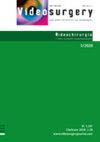晚期低位直肠癌治疗性侧淋巴结清扫术中进行单侧与双侧下膀胱血管切除术并保留自主神经后的早期排尿功能(附视频)
IF 1.9
4区 医学
Q2 SURGERY
引用次数: 0
摘要
导言在亚洲国家,侧淋巴结清扫术(LLND)已被广泛接受为减少晚期下段直肠癌侧局部复发(LLR)的最佳手术方法。然而,由于担心术后排尿功能受损,在 LLND 过程中保留或切除下膀胱血管(IVV)仍存在争议。材料和方法2017年5月至2022年10月,天津协和医院连续为106例晚期低位直肠癌患者实施了LLND。回顾性比较了前瞻性收集的单侧和双侧 LLND 患者的临床数据。结果 单侧淋巴结清扫(LND)组和双侧LND组分别包括75例和31例患者。所有LLND均采用FSPA进行,并将IVV切除术作为标准手术。两组患者的总导管插入天数(P = 0.336)和再次导管插入率(P = 0.575)无明显差异。两组患者均未出现长期(≥ 30 天)排尿功能障碍。结论LLND术中切除IVV可达到保留自主神经的目的,通过切除两侧IVV可获得满意的早期排尿功能。本文章由计算机程序翻译,如有差异,请以英文原文为准。
Early-stage voiding function following uni- versus bilateral inferior vesical vessel resection during therapeutic lateral lymph node dissection with autonomic nerve sparing for advanced low rectal cancer (with video)
Introduction
Lateral lymph node dissection (LLND) has now been widely accepted as the optimal procedure to minimize lateral local recurrence (LLR) for selected cases with advanced lower rectal cancer in Asian countries. However, there is still controversy over the preservation or resection of the inferior vesical vessels (IVVs) during LLND due to concerns of impaired post-operative urinary function. Moreover, the standardized procedure for autonomic nerve preservation has not yet been established.
Aim
To evaluate the early-stage postoperative voiding function in patients who underwent LLND with uni- versus bilateral resection of the IVVs and to introduce an autonomic nerve sparing technique with a fascial space priority approach (FSPA).
Material and methods
LLND was performed in 106 consecutive patients with advanced low rectal cancer at Tianjin Union Medical Center from May 2017 to October 2022. Prospectively collected clinical data were retrospectively compared between patients who received uni-lateral and bilateral LLND. A video with narration was provided to introduce the stepwise procedure of autonomic nerve preservation during IVV resection.
Results
The unilateral lymph node dissection (LND) group and the bilateral LND group included 75 and 31 cases, respectively. All LLNDs were performed with FSPA with IVV resection as a standard procedure. No significant differences were observed in overall catheterization days (p = 0.336) and re-catheterization rate (p = 0.575) between groups. No patients in either group suffered from long-term (≥ 30 days) voiding dysfunction.
Conclusions
Autonomic nerve sparing is achievable with resection of IVVs during LLND. Satisfactory early-stage voiding function could be obtained with IVV resection on both sides.
Lateral lymph node dissection (LLND) has now been widely accepted as the optimal procedure to minimize lateral local recurrence (LLR) for selected cases with advanced lower rectal cancer in Asian countries. However, there is still controversy over the preservation or resection of the inferior vesical vessels (IVVs) during LLND due to concerns of impaired post-operative urinary function. Moreover, the standardized procedure for autonomic nerve preservation has not yet been established.
Aim
To evaluate the early-stage postoperative voiding function in patients who underwent LLND with uni- versus bilateral resection of the IVVs and to introduce an autonomic nerve sparing technique with a fascial space priority approach (FSPA).
Material and methods
LLND was performed in 106 consecutive patients with advanced low rectal cancer at Tianjin Union Medical Center from May 2017 to October 2022. Prospectively collected clinical data were retrospectively compared between patients who received uni-lateral and bilateral LLND. A video with narration was provided to introduce the stepwise procedure of autonomic nerve preservation during IVV resection.
Results
The unilateral lymph node dissection (LND) group and the bilateral LND group included 75 and 31 cases, respectively. All LLNDs were performed with FSPA with IVV resection as a standard procedure. No significant differences were observed in overall catheterization days (p = 0.336) and re-catheterization rate (p = 0.575) between groups. No patients in either group suffered from long-term (≥ 30 days) voiding dysfunction.
Conclusions
Autonomic nerve sparing is achievable with resection of IVVs during LLND. Satisfactory early-stage voiding function could be obtained with IVV resection on both sides.
求助全文
通过发布文献求助,成功后即可免费获取论文全文。
去求助
来源期刊
CiteScore
2.80
自引率
23.50%
发文量
48
审稿时长
12 weeks
期刊介绍:
Videosurgery and other miniinvasive techniques serves as a forum for exchange of multidisciplinary experiences in fields such as: surgery, gynaecology, urology, gastroenterology, neurosurgery, ENT surgery, cardiac surgery, anaesthesiology and radiology, as well as other branches of medicine dealing with miniinvasive techniques.

 求助内容:
求助内容: 应助结果提醒方式:
应助结果提醒方式:


